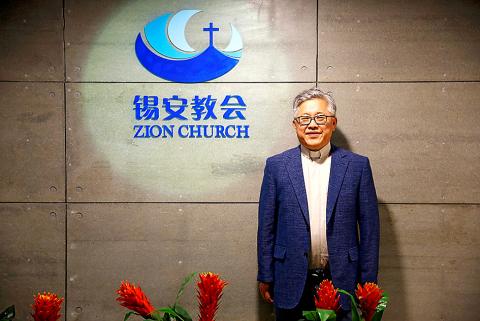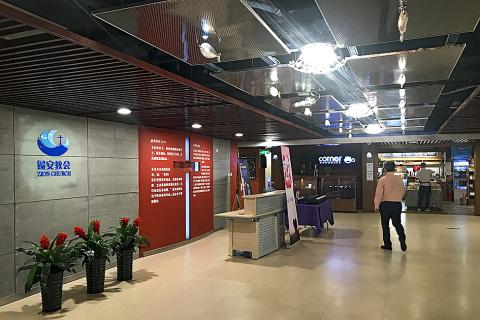Beijing officials have shut down one of China’s largest “underground” Protestant churches for operating without a license, the government’s latest move to ramp up control over religious worship.
About 70 officials stormed into the Zion Church — housed on the third floor of a nondescript office building in the north of the capital — after its afternoon service on Sunday, church Pastor Ezra Jin Mingri (金明日) said yesterday.
“They chased everyone out and sealed off the place, even tearing down our signage on the wall,” Jin said. “All our things have been confiscated and we have not been allowed to re-enter the building.”

Photo: Reuters
The local civil affairs bureau said the church and its affiliates have been banned.
“After investigation, [we found] the ‘Zion Church in Beijing’ was not registered and carried out activities in the name of social organizations without authorization,” the Chaoyang district civil affairs bureau said in a statement.
Jin was among about 200 pastors from underground churches who put their name to a petition complaining of “assault and obstruction” by the government — including the tearing down of crosses — since new religious regulations came into effect in February.

Photo: AP
Zion was one of the largest “house” churches in Beijing, with up to 1,500 people attending its weekly services.
At least a dozen marked police vehicles and scores of officers in uniform and plainclothes yesterday were guarding the building where the congregation held its services.
Journalists were barred from entering the building. The officers said the third floor was sealed off.
News of Zion’s closure came after Bob Fu (傅希秋) of the US-based China Aid group said over the weekend that the closure of churches in Henan Province and actions taken against Zion in recent weeks represented a “significant escalation” of the government’s crackdown on Christian congregations.
The campaign corresponds with a drive to “Sinicize” religion by demanding loyalty to the Chinese Communist Party and eliminating any challenge to its power over people’s lives.
“The international community should be alarmed and outraged for this blatant violation of freedom of religion and belief,” Fu wrote in an e-mail to reporters.
Fu also provided video footage of what appeared to be piles of burning Bibles and forms stating that the signatories had renounced their Christian faith.
He said that marked the first time since Mao Zedong’s (毛澤東) 1966 to 1976 Cultural Revolution that Christians had been compelled to make such declarations, under pain of expulsion from school and the loss of welfare benefits.
A Christian pastor in Nanyang, Henan Province, said crosses, Bibles and furniture were burned during a raid on his church on Wednesday.
The pastor, who asked not to be identified by name to avoid repercussions from authorities, said several people entered the church just as it opened its doors at 5am and began removing items.
He said the church had been in discussions with local authorities who demanded it “reform” itself, but no agreement had been reached or official documents released.
A local official reached by telephone at the Nanyang City Government disputed the account, saying officials respected religious freedom.
The man declined to give his name, as is common with Chinese bureaucrats, while a person answering phones at the local religious affairs bureau said they were “not clear” about the matter.

VAGUE: The criteria of the amnesty remain unclear, but it would cover political violence from 1999 to today, and those convicted of murder or drug trafficking would not qualify Venezuelan Acting President Delcy Rodriguez on Friday announced an amnesty bill that could lead to the release of hundreds of prisoners, including opposition leaders, journalists and human rights activists detained for political reasons. The measure had long been sought by the US-backed opposition. It is the latest concession Rodriguez has made since taking the reins of the country on Jan. 3 after the brazen seizure of then-Venezuelan president Nicolas Maduro. Rodriguez told a gathering of justices, magistrates, ministers, military brass and other government leaders that the ruling party-controlled Venezuelan National Assembly would take up the bill with urgency. Rodriguez also announced the shutdown

Civil society leaders and members of a left-wing coalition yesterday filed impeachment complaints against Philippine Vice President Sara Duterte, restarting a process sidelined by the Supreme Court last year. Both cases accuse Duterte of misusing public funds during her term as education secretary, while one revives allegations that she threatened to assassinate former ally Philippine President Ferdinand Marcos Jr. The filings come on the same day that a committee in the House of Representatives was to begin hearings into impeachment complaints against Marcos, accused of corruption tied to a spiraling scandal over bogus flood control projects. Under the constitution, an impeachment by the

Exiled Tibetans began a unique global election yesterday for a government representing a homeland many have never seen, as part of a democratic exercise voters say carries great weight. From red-robed Buddhist monks in the snowy Himalayas, to political exiles in megacities across South Asia, to refugees in Australia, Europe and North America, voting takes place in 27 countries — but not China. “Elections ... show that the struggle for Tibet’s freedom and independence continues from generation to generation,” said candidate Gyaltsen Chokye, 33, who is based in the Indian hill-town of Dharamsala, headquarters of the government-in-exile, the Central Tibetan Administration (CTA). It

A Virginia man having an affair with the family’s Brazilian au pair on Monday was found guilty of murdering his wife and another man that prosecutors say was lured to the house as a fall guy. Brendan Banfield, a former Internal Revenue Service law enforcement officer, told police he came across Joseph Ryan attacking his wife, Christine Banfield, with a knife on the morning of Feb. 24, 2023. He shot Ryan and then Juliana Magalhaes, the au pair, shot him, too, but officials argued in court that the story was too good to be true, telling jurors that Brendan Banfield set